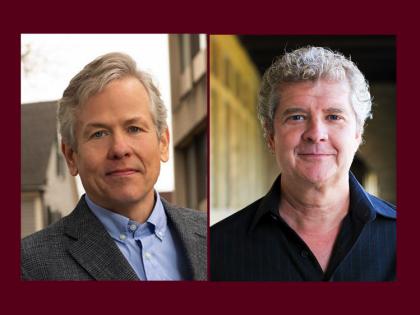The celebrated Nixon in China (1987) by composer John Adams ’69, A.M. ’72, was the first of four operas that, along with many orchestral and chamber works, have won him international renown. On the Transmigration of Souls, a musical memorial to the victims of the September 11, 2001, attacks, won the 2003 Pulitzer Prize and a recorded version later captured three Grammy awards. Here are some of the remarks Adams made this May during Arts First weekend, when he received the 2007 Harvard Arts Medal.
~C.L.
When I compose or orchestrate, I imagine that I am in front of a huge mixing board or a divine synthesizer, and I think that way.
Collaboration is probably up there with double ax-murder in terms of the most painful things two people can do to each other.
What makes my operas special is that they are based quite fastidiously on the real historical facts.
Peter [Sellars]'s first idea was to have Kissinger absolutely mute in the opera, but I thought, why pass up such an obvious buffo character? [Director Peter Sellars '80, the 2001 Arts Medalist, has collaborated on all four of Adams's operas.]
[Los Alamos, the setting of Adams's opera Doctor Atomic] is one of the great American stories because it combines Yankee ingenuity with this obsessively beautiful imagelet's face it, atomic bombs are kind of morbidly sexy.
I actually set declassified government documents. I have to tell you that setting the word "practicable" took me an afternoon.
Ada has become a kind of vehicle for vocal showboating and not really a comment on the human condition. I want this art form, opera, to be about our experience as Americans living right now.
I have bad days when I really feel that I'm working in an art form that's just not relevant anymore, that had its peak in the years from Vivaldi to Bartk, and now we are just fighting over the crumbs.
A really good recording of mine might sell 50,000 copies; that's very rare in classical music. For a rock group, 50,000 CDs sold would be a disaster.
If I were to do something cheap or rushed or not as good as it should be, I'm going to have to live with it. The reason we call it classical music is that we hope in 100 years, it will still be heard.
Harmony is where the psychological meaning of the music is. [Twelve-tone composers] wrote atonal music, and at the same time Duke Ellington, Richard Rodgers, and George Gershwin were having a fine time with harmony.
If you write the Great American Opera, then what's going to come after that? The Not-So-Great American Opera?







